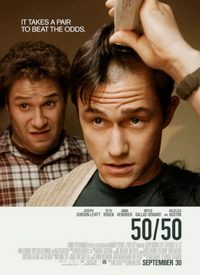
The film is inspired by the true story of 27-year-old screenwriter Will Reiser, Rogen's friend in real life (known a Adam Lerner in the film and played by Joseph Gordon-Levitt), who is diagnosed with a rare form of cancer. When Adam learns that the survival rate of the disease is only 50 percent, he undergoes a crisis that provokes him to reflect on his life and the relationships that have shaped his existence.
50/50 does the unthinkable by actually making light of a dark and disturbing topic. In fact, there is a great deal of levity in the two-hour film, inspired by the adept writing of Will Reiser, who sharply manages to capture his own personal experiences. The script features lively, witty, and at times hilarious banter, while managing to shift moods rather smoothly to serious discussions of life and death.
One fascinating angle of the film is its exploration of the strange dichotomy of emotions that many of those with cancer experience — at once feeling completely alone, and yet overwhelmed by the support of loved ones. Perhaps understandably, Adam is focused solely on how he is affected by his diagnosis, without much consideration for its impact on those who love him. And when he does take a moment to consider the perspective of others, he develops misconceptions about their feelings.
For example, Adam believes his best friend, Kyle (Seth Rogen), is virtually disengaged from Adam’s emotional roller coaster, and he accuses Kyle of being concerned with just one thing: meeting women. It is not until later that Adam learns that his best friend has in fact put up a courageous, albeit at times obnoxious, front to cope with his feelings of grief and fear at the possibility of losing Adam.
Adam misunderstands virtually all those who surround him, including his own mother, whom at first he considers to be merely a nuisance. As a result, he chooses to ignore her rather than deal with the frustrations of engaging her for even a few moments on the telephone. He becomes so engulfed in self-pity that he scarcely takes a moment to consider his mother’s plight: already caring for a husband with advanced Alzheimer's, and now facing the imminent death of her son.
And Adam’s relationship with his cheating ex-girlfriend is not as black and white as he would like to believe. Even before his diagnosis, he and Rachael (Bryce Dallas Howard) were already growing apart. Once she learns of Adam's cancer, however, Rachael does her best to stand by him, all the while recognizing that she feels little more for him than pity. She struggles with what she thinks is the right thing to do, on one hand, and what she needs to do to secure her own happiness on the other.
The film's focus is on Adam's struggle to learn how to rely on those around him to help him cope with his experiences. The 50/50 screenplay is artfully written, with scenes both amusing and at the same time provoking feelings of grief and empathy from even the most stoic moviegoer.
Likewise, the actors are all worthy of applause, particularly Joseph Gordon-Levitt, whose Academy Award-level performance is a masterpiece of subtlety. He manages to depict the complicated range of emotions of a young man struggling with fears of mortality and feelings of ineptitude, as well as misconceptions of being simultaneously both ignored and smothered.
Additionally, Seth Rogen’s performance is certainly worth mentioning. While his recognizable brand of humor is present in 50/50 in much the same way as in his previous movies, he does manage to capture significant tonal shifts which highlight the depth of his friendship with Adam. His role in 50/50 is reminiscent of that of his character in Funny People, in which he co-starred with Adam Sandler, who played a comedian also struggling with a cancer diagnosis.
The supporting actresses performed well, including Anna Kendrick, who plays Adam’s young enthusiastic therapist. Even though Gordon-Levitt commands the majority of the audience's attention and emotions, these actresses manage to provoke feelings of sympathy as well.
Sadly, the film is marred by a great deal of adult humor, as one has come to expect from a Seth Rogen movie. Likewise, Adam is a 27-year-old young man who finds himself on a quest for love that takes him through a series of “missteps,” at times involving casual sexual encounters, or vulgar sexual innuendoes referring to the pursuit of such encounters.
50/50 also has many scenes of marijuana smoking, though for the most part the marijuana is portrayed as medicinal, intended to help Adam cope with the sickening side effects of chemotherapy.
Overall, the film is humorous, moving, and engaging, yet also often vulgar, with sexual immorality. It is certainly not meant for younger audiences.




